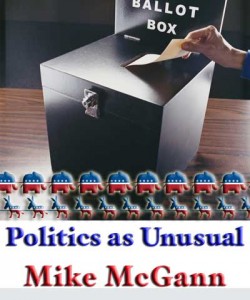As campaigns trumpet numbers, do they tell us anything?
By Mike McGann, Editor, The Times
 Well, they’re everywhere. Media announcements about the number of signatures a given candidate has gotten to get on the ballot as if it means something.
Well, they’re everywhere. Media announcements about the number of signatures a given candidate has gotten to get on the ballot as if it means something.
For those who don’t know, political candidates must collect signatures from registered voters in their district — they must be of the same political party. State house candidates must get a minimum of 300, while congressional candidates must get more — and gubernatorial candidates even more, and in the last case, a minimum number from at least 10 counties. It is complicated, technical and grueling work.
Look, having gone door-to-door more times than I’d like to remember seeking signatures for myself or others, I understand how difficult it is. And I understand the sense of accomplishment (and relief) of getting enough signatures — a good rule of thumb is to get about twice as many as needed, in case there are challenges (and the bigger the number, the less likely there will be a challenge — although as we’re seeing in the case of Jay Paterno in the Lt. Governor’s race, it’s not always enough).
Of course, it newsworthy when an established candidate fails to get the number or just barely gets over the needed number — indication of likely both a poor campaign organization and a lack of support among party activists.
I do put a little more stock in how many signatures a candidate got for himself or herself — in part because it shows a work ethic — but also because it shows that he or she is actively speaking with voters and, hopefully, listening.
Joshua Young — the Democratic candidate in the 74th and a Caln Commissioner — didn’t send out a press release, but did send out an email to supporters noting that he had personally collected 263 signatures, and noted that his Democratic primary opponent, Downingtown Mayor Josh Maxwell collected 36 signatures personally, Young said. Republican candidate Harry Lewis Jr., Young said, collected 59. Inspection of the petitions filed appears to support these claims.
It’s a smart item to put out to supporters and possible financial backers — and rightly the Young campaign didn’t make a big deal of it in the press.
At the end, though, signature numbers are only a hint of a campaign’s ability to reach and turn out their voters — the numbers filed in Harrisburg are just a tiny number of the number of votes needed to win a primary, let alone the general election. A bigger, and better indication, will come in early April when the Cycle 1 campaign finance reports are in.
Let’s be honest — money matters. It’s why the governor’s race very suddenly appears to be a two-man race, between Gov. Tom Corbett and Democrat Tom Wolf. Former alleged Democratic front-runners Rob McCord and Allyson Schwartz are rapidly becoming little more than afterthoughts — and the rest of the field might as well be in the Witness Protection Program.
Both candidates have had the money to run a lot of campaign commercials already — with Wolf going from just one of the pack to having a runaway lead. In fact, Corbett appeared this week to pivot from general Democrat-bashing to focusing on Wolf — as the two sparred over natural gas severance taxes.
In the local races, local fundraising leads to more money — state party campaign committees, say the House Democratic Campaign Committee (assuming they have any money left after spending it on incumbents), looks to a candidate’s fundraising (and a host of other factors, such as whether the seat is open and how the district typically votes) before deciding to commit money and people to local races.
In a race like the 74th, it’s a safe bet that both state house party campaigns will be putting money into the race. But in other races, that money will likely be more one-sided: take for example, the 158th. While it seems likely that House Republicans will fund Cuyler Walker in his race to replace the retiring State Rep. Chris Ross, it seems unlikely that HDCC will step up for his Democratic opponent Susan Rzucidlo. Edit: we are reminded that Roger Howard is continuing his race for State Rep. despite having lost the party endorsement.
The same story will likely be repeated elsewhere in the county, if I had to guess.
That’s interesting and potentially more important that you’d think. Republican insiders privately are worried that Corbett’s current horrific polling numbers could really depress GOP voter turnout in November and put some of the county’s legislative seats (a lot of the worry seems focused on Dan Truitt in 156 and Duane Milne in 167) in play.
Conversely, though, strong state house races by local Republicans could generate enough voter turnout to get Corbett enough “hold-your-nose-and-vote” votes that he manages to carry Chester County, which is crucial to his reelection efforts. That sets up a scenario where Wolf might be forced to put money in some of these local races — knowing the HDCC can’t or won’t.
Again, it’s early, but something to keep in mind as you watch the race unfold.








The subject of this article is about petitions with an emphasis on the work ethic required by a candidate to personally gather many signatures.
I agree, and to be fair and unbiased, this news outlet should extend the same courtesy to Mr. Howard. Please edit the article to inform the voters of the 158th District that Roger personally collect 306 signatures, which I believe indicates a strong work ethic.
Thank you
Uh, no. That’s not what this column is about — it’s whether petitions matter.
Had Mr. Howard decided to analyze which candidates collected petitions themselves — as the Young campaign did in the 74th — and put it out to his supporters, then it you might have a point about fairness. But as he didn’t, it would be patently unfair to expect me to do the work of his campaign.
Republican Roger Howard, long time resident of East Marlborough Twp, is a candidate to become the next Pa State Rep from the 158th House District.
http://www.roger4pa.com
Roger personally collected 306 petition signatures by going door-to-door throughout his district for a total of 492 signatures collected.
Roger is a fiscal & constitutional conservative and his name will appear on the Republican primary ballot May 20th.
We have amended the column to note Roger is still in the race. Our inquiry as to whether he was still running did not get a reply.